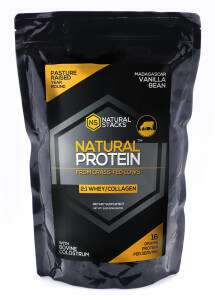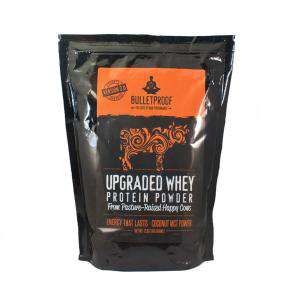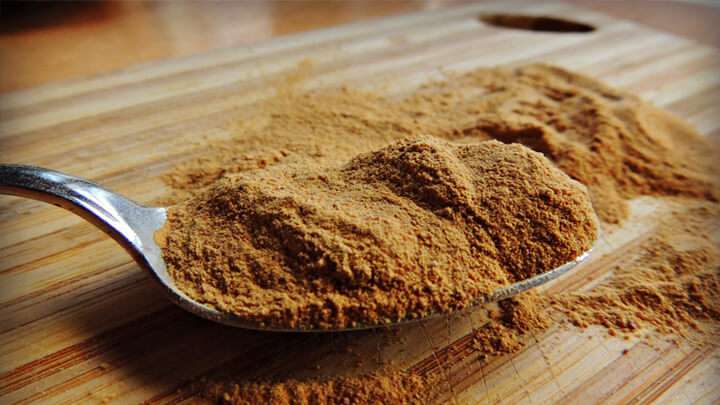The Whey Out: 5 Best Natural Protein Powders
Bodybuilders and athletes often seek new ways to increase their ability to perform and recover quickly after the workout is over.
This segment of the population has discovered a way to do this. Protein powder supplements are exactly what bodybuilders and athletes need to recover, but there’s a small problem…
Most protein powder supplements are non-organic and contain several unhealthy ingredients, goes against weightlifters’ goals: to be fit and healthy.
As athletes strive for peak performance, clean eating trends have prompted supplement companies to produce organic, natural grass fed whey protein powders that are much healthier than the options of the past.
How Whey Benefits the Body
Whey protein powder supplements contain the branched-chain amino acids (BCAAs) leucine, isoleucine and valine, and studies have shown that they directly benefit the muscles. Leucine is the most important for muscle-building because it aids in protein synthesis.
Bodybuilders and athletes take supplements with leucine before workouts to help increase lean muscle mass gains from the workout. While both BCAAs have proven benefits, isoleucine has been shown to play the largest role in increasing people’s ability to perform physically.
What’s In Your Whey Protein? A Look At Additives
Whereas leucine and isoluceine are welcome additives to protein powder — they help with muscle recovery — there are many unwanted and unhealthy additives, too. If bodybuilders and athletes obtain their whey protein from non-organic sources, they gain other things that they may not have been expecting.
Toxic Heavy Metals
The highly respected consumer advocacy organization Consumer Reports Magazine studied several non-organic whey protein supplements and discovered something disturbing: many of these products contain the toxic heavy metals arsenic, cadmium, mercury and lead in concentrations higher than levels that are considered to be safe.
Cadmium, for example, is known to build up in the liver where it can cause considerable damage. To make things even worse, these products are being marketed as daily supplements to be taken as much as three times a day.
Protein Isolate from Grain-Fed Cows
Manufacturers derive whey protein from milk. Meaning, the protein is isolated during the cheese-making process. Therefore, bodybuilders and athletes are very interested in where manufacturers obtain their whey, and from what cows.
Non-organic whey comes from grain-fed cows, but the grain these cows receive has been tested and found to contain pesticides and fertilizers that are discharged into the milk.
These cows are also given hormones and antibiotics so that they would produce more milk. Bovine growth hormone is just one of those substances, and it has been banned in Europe, Canada, Japan, Australia, New Zealand and Argentina.
Unhealthy Additives
Manufacturers of non-organic whey protein add many other unhealthy substances to their products. For example, medical professionals believe that the artificial sweeteners sucralose, aspartame and acesulfame k are unhealthy for humans to consume, but several whey protein products contain these substances (1, 2) .
They may also have the genetically modified organisms or GMOs that are so worrisome to many people in the health industry.
In order to make their products heavier and, therefore, more expensive, manufacturers put fillers into their whey protein powders that do not add any nutritional benefit to the bodybuilder/athlete.
One unnecessary filler that may actually be harmful to some people is a soy product called “soy lecithin.” Generally, whey protein powder is meant to be mixed with milk, water or juice, but it doesn’t always mix easily with these liquids.
That’s why manufacturers place soy lecithin in their powders. The problem is that most soy is genetically modified.
It is also believed to be estrogenic which means that it increases estrogen levels, and this makes it more difficult to lose body fat and gain muscle mass. As if all that wasn’t bad enough, soy can prevent other nutrients from being properly absorbed.
The Other Side
Grass fed protein powder comes from cows that were fed what a cow naturally eats: grass. Because of this, they are missing the fertilizers and pesticides that contaminate the milk of non-organic cows.
Further, organic farmers do not inject their cows with the growth hormones and antiobiotics that keep the body from functioning properly.
Natural Protein Powder Products (Organic)
With so many different organic protein powder products on the market, the best natural protein powder will be a matter of personal preference, but you have several options.
1. Natural Protein by Natural Stacks
Natural Protein from Natural Stacks is an all natural protein powder made from the milk of grass-fed cows. It does not have any antibiotics or hormones and is free of genetically modified organisms.
from Natural Stacks is an all natural protein powder made from the milk of grass-fed cows. It does not have any antibiotics or hormones and is free of genetically modified organisms.
Along with whey, this product contains collagen protein that reduces the amount of time needed to recover from a hard workout.
It also has one very important ingredient that you will not find in most whey protein powders: colostrum. Colostrum is important to bodybuilders and athletes specifically because it promotes recovery in the muscles, ligaments and tendons.
This product doesn’t have any added sugar, but it does have a significant amount of iron, sodium, potassium, immunoglobulins, lactoferrin and serum albumin. It also contains eight of the essential amino acids that include the three branched-chain amino acids.
Several users considered this product to be the best organic protein powder they have ever tried. Others were impressed with the natural taste. The powder blends well in a shaker and is great for making smoothies or for just mixing with water.
2. Bulletproof Upgraded Whey 2.0 Grass-Fed Whey Protein
 This organic protein powder does not have any hormones, high fructose corn syrup, artificial sweeteners, sugars or non-dairy products. Gluten-sensitive people will like the fact that it is gluten-free. It does not contain any soy products, fillers, artificial flavors or colors or genetically modified organisms.
This organic protein powder does not have any hormones, high fructose corn syrup, artificial sweeteners, sugars or non-dairy products. Gluten-sensitive people will like the fact that it is gluten-free. It does not contain any soy products, fillers, artificial flavors or colors or genetically modified organisms.
Grass-Fed Whey Protein was manufactured to offer users a pleasant taste that is creamy and rich, and people agree that it fits this description. They loved how well the powder mixed with all types of beverages, including milk. They also liked the taste and how compatible it was for making smoothies.
3. Tera’s Whey
Tera’s Whey grass-fed organic whey protein is gluten-free, GMO-free and hormone-free. It is low in cholesterol, calories, saturated fat and trans fat. Along with protein, this supplement has the antioxidants vitamin A and vitamin C as well as calcium and iron. Although this product contains other plant-based ingredients, these are also organic, such as organic vanilla, organic sunflower lecithin and organic stevia leaf extract.
Tera’s Whey stands out for being a product that is created in a green factory. The manufacturers made sure to use the products grown by small family farms in Wisconsin. Similarly, the cheese comes from local cheesemakers in the state.
Several lifters who’s used Tera’s Whey and other products believe that Tera’s Whey is the best. One bodybuilder reports that It is a great meal replacement. Another athlete wouldn’t recommend adding this product to foods such as oatmeal because it doesn’t mix as well in foods as it does in liquids.
4. Source Organic Whey
Source Organic Whey is processed in a facility that uses low temperatures during manufacturing. This helps keep the proteins intact, yielding a pure isolate that is as effective as possible in aiding in recovery and building muscle.
Although the milk is treated at low temperatures, Source ensures that they follow the guidelines set forth by the FDA.

Essential ingredients for a protein. banana, chocolate smoothie or cookie mix.
Other reasons why Source Organic Whey is great:
- It is not treated with acid or bleach.
- The milk used to create it comes from grass-fed cows from California.
- Along with the essential and branched-chain amino acids, Source Organic Whey also contains calcium, riboflavin, magnesium and phosphorus.
Source Organic Whey has the distinction of being the only whey protein powder that was examined by the Non-GMO Project and the American Humane Association. The first organization verified that this product is genuinely free of GMOs, and the second certified the protein.
5. Now Foods Certified Organic Whey Protein
Now Certified Organic Whey Protein contains eight essential and nine non-essential amino acids. Fortunately for bodybuilders and athletes, Now added a ton of branched-chain amino acids (BCAAs). Specifically, it contains 1,193 mg of isoleucine, 2,386 mg of leucine and 1,116 mg of valine.
Users agree that this product is very healthy. They like the fact that it is organic and highly nutritious. The product fills people up so that they can use it as a meal replacement, and they are happy with the taste.
Athletes who prefer a little more flavor reported tasty results from mixing the powder with a beverage or creating a smoothie. One bodybuilder in particular was looking for a whey protein that did not contain a large amount of cholesterol, and was happy to have found a solution with Now Foods’ whey.
Conclusion
The case has been made for organic whey protein. Non-organic whey protein contains too many impurities and dangerous metals to ensure that bodybuilders and athletes can maintain their health.
This growing need for organic sources of whey protein makes grass-fed whey protein the better option because it does not contain any of the negative additives, such as antibiotics, hormones, acids, bleach, pesticides, fertilizers and heavy metals.
With so many alternatives at your disposal, the best organic protein powder for you is practically right at your fingertips.
[catlist excludeposts=this template="div" conditional_title_tag="h6" conditional_title="More on Sport" id="1007"] [catlist excludeposts=this template="div" conditional_title_tag="h6" conditional_title="SARMs for building muscles, endurance, and weight loss" id="596" tags="using"]

